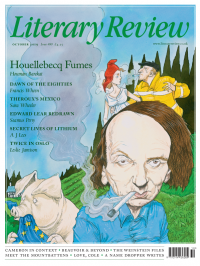Jonathan Meades
Happy-Clappy Brutalism
100 Churches 100 Years
By Susannah Charlton, Elain Harwood & Clare Price (edd)
Batsford 208pp £25
During an interview conducted in 1959, Clement Attlee said that while he believed in the ethics of Christianity, he could not believe in ‘the mumbo-jumbo’. Most intelligent people of his generation would doubtless have agreed with him. Among those intelligent people were neophiliac theologians, architecturally inclined priests, ecumenicists, Catholics, Anglicans and champions of vernacular prayer who broadly welcomed the liturgical reforms of the Second Vatican Council, not yet realising that they presaged guitar-toting vicars strumming ‘Kumbaya’ and drab worship spaces littered with leaflets begging for contributions to missions in Africa. Established in 1957, the New Churches Research Group, led by the Hellenophile priest and ecclesiastical architectural theorist Peter Hammond, wished to create Anglican churches that sought, in the words of Elain Harwood, ‘an architecture without “tricks”’. An architecture, then, that accorded with certain British secular norms of the time. The influence of theatre in the round and the removal of the fourth wall cannot be underestimated, nor that of the lecture spaces of the new universities.
This architecture abjured the neo-expressionism that was fashionable in France, Switzerland, Austria and, most significantly, Germany (church design is as susceptible to fashion as lapel width or forms of governance). The architecture of Gottfried Böhm, Walter Maria Förderer and Fritz Wotruba is dense with tricks. Böhm’s Mariendom (1963)

Sign Up to our newsletter
Receive free articles, highlights from the archive, news, details of prizes, and much more.@Lit_Review
Follow Literary Review on Twitter
Twitter Feed
The son of a notorious con man, John le Carré turned deception into an art form. Does his archive unmask the author or merely prove how well he learned to disappear?
John Phipps explores.
John Phipps - Approach & Seduction
John Phipps: Approach & Seduction - John le Carré: Tradecraft; Tradecraft: Writers on John le Carré by Federico Varese (ed)
literaryreview.co.uk
Few writers have been so eagerly mythologised as Katherine Mansfield. The short, brilliant life, the doomed love affairs, the sickly genius have together blurred the woman behind the work.
Sophie Oliver looks to Mansfield's stories for answers.
Sophie Oliver - Restless Soul
Sophie Oliver: Restless Soul - Katherine Mansfield: A Hidden Life by Gerri Kimber
literaryreview.co.uk
Literary Review is seeking an editorial intern.